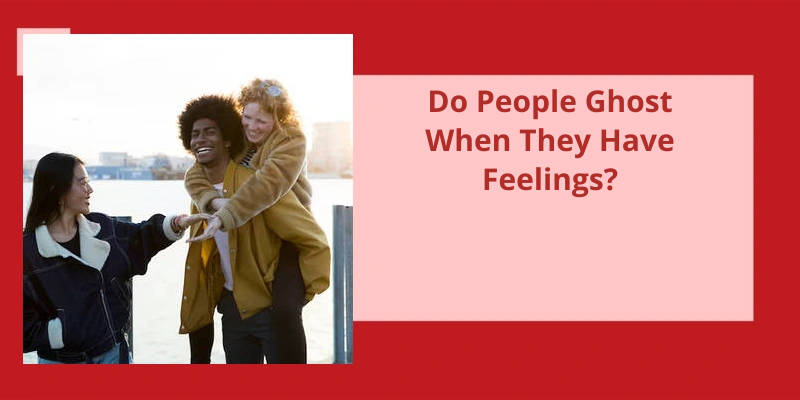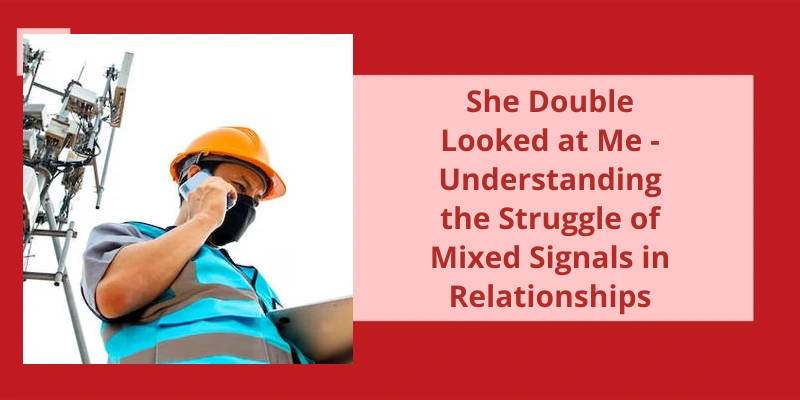Instead of facing their emotions head-on, some individuals resort to ghosting as a defense mechanism. Ghosting, the act of abruptly cutting off all communication with someone without any explanation or closure, may seem perplexing and hurtful to the recipient, but it may be a manifestation of the ghoster's own emotional turmoil. This phenomenon is rooted in an individual's comfort level and their ability (or inability) to navigate their own feelings. The fear of confrontation and discomfort often leads them to adopt the strategy of avoidance rather than addressing their emotions directly. Consequently, rather than openly discussing their feelings or potentially facing conflict, they choose to disconnect and disappear, leaving the other person confused and wondering what went wrong. Understanding the underlying reasons behind this perplexing behavior can shed light on the complexity of human emotions and the ways in which individuals cope with them.
What Is the Emotional Pain of Being Ghosted?
Jennifer Rhodes, a licensed psychologist and relationship expert. When someone is ghosted, they’re left wondering what went wrong and why the person they’d feelings for suddenly disappeared. This lack of closure can be emotionally painful and can lead to feelings of self-doubt and worthlessness.
The emotional pain of being ghosted can be amplified when there were strong feelings involved. If a person had developed a deep connection with someone, being suddenly cut off without explanation can feel like a betrayal. It can leave them questioning their own worth and desirability. They may even start to blame themselves for the ghosting, believing that they did something wrong or werent good enough.
They may become guarded and hesitant to open themselves up to new people, fearing that they might be ghosted again. This can make it difficult for them to form new connections and move on from the pain of being ghosted.
The Impact of Ghosting on Mental Health
- The feeling of being ignored or rejected by someone can negatively affect mental health.
- Ghosting can lead to feelings of self-doubt and low self-esteem
- It can trigger anxiety and depression
- Ghosting can erode trust and make it difficult to form new relationships
- It can cause individuals to question their self-worth and value
- Ghosting can increase feelings of loneliness and isolation
- It may contribute to a cycle of avoidance and fear of rejection
- Mental health professionals suggest open communication to prevent the detrimental effects of ghosting
- Providing closure and understanding can help mitigate the impact of ghosting on mental health
- Seeking support from friends, family, or therapists can assist individuals in processing the emotional repercussions of ghosting
The emotional experience of ghosters is complex and varied, as recent research suggests. While ghostees often report feelings of hurt and sadness, ghosters themselves may not be exempt from negative emotions. Surprisingly, the study shows that ghosters tend to express guilt more frequently than any other emotion. Furthermore, the level of relief experienced by ghosters is contingent upon the nature of their relationship and the reasons behind their decision to end it. These findings shed light on the intricate emotional landscape of those who engage in ghosting.
Do Ghosters Feel Sad?
Do people ghost when they’ve feelings? This question has intrigued researchers and individuals alike. The act of ghosting, abruptly cutting off communication with someone without any explanation or closure, has become a prevalent behavior in modern dating culture.
According to studies, ghosters do experience a range of emotions, but their feelings differ from those of the ghostees. Researchers found that ghosters were likelier to express negative emotions like guilt rather than the hurt and sadness experienced by the recipients of ghosting. This suggests that ghosters may indeed feel a level of remorse for their actions.
Interestingly, the emotional experience of ghosting can also depend on the nature of the relationship and the reasons behind the decision to ghost. For them, ending the connection and cutting off communication can offer a sense of freedom and liberation.
They may feel conflicted about their decision and the pain they potentially inflict upon the other person. The emotional turmoil experienced by these ghosters may indicate that they do indeed have feelings but struggle to confront them.
The extent and intensity of these emotions may vary depending on the nature of the relationship and personal circumstances.
The Psychological Impact of Ghosting on the Ghostee
Ghosting is a term used to describe the act of suddenly cutting off all communication and contact with another person, typically in a romantic or interpersonal relationship, without any explanation or warning. While ghosting can have negative effects on both parties involved, the psychological impact on the person being ghosted, also known as the ghostee, can be particularly significant.
Being on the receiving end of ghosting can lead to feelings of confusion, rejection, and self-doubt. The sudden and unexplained disappearance of someone they were emotionally invested in can leave the ghostee questioning their self-worth and desirability. They may wonder what they did wrong or why they weren’t important enough for the other person to provide closure.
Ghosting can also leave the ghostee with a sense of powerlessness and a fear of emotional intimacy. They may become guarded and hesitant to open up to new relationships for fear of experiencing the same rejection again. This can impact their overall psychological well-being and make it difficult for them to trust others.
It’s important to recognize that ghosting is a reflection of the ghoster’s communication style and emotional maturity, rather than a reflection of the ghostee’s worth as an individual. Seeking support from friends, family, or a therapist can help the ghostee navigate the emotional aftermath of ghosting and rebuild their self-esteem and trust in relationships.
According to Ortman, emotionally unavailable men often exhibit telltale signs. These signs may include a difficulty in expressing emotions, an aversion to commitment, and a tendency to withdraw from intimate conversations. Inevitably, this emotional unavailability can lead to ghosting, wherein the individual abruptly cuts off communication without explanation. However, it’s important to remember that not all emotionally unavailable men will resort to ghosting. Some may choose other forms of avoidance or become distant during challenging situations.
Do Emotionally Unavailable Men Ghost?
One of these signs is a tendency to avoid or shy away from emotional intimacy and vulnerability. When confronted with strong emotions or deep connections, emotionally unavailable individuals may retreat or withdraw. They may struggle with opening up and expressing their feelings, finding it easier to detach and detach themselves from the situation.
Another indicator of emotional unavailability is a pattern of self-sabotage in relationships. These individuals may have a tendency to push people away or create distance when things start to get serious. They may be afraid of being hurt or vulnerable, and as a result, they ghost and disappear rather than facing the potential risks of emotional involvement.
Furthermore, emotionally unavailable men typically have difficulty with emotional regulation and expressing their emotions in a healthy way. Instead of managing their feelings or engaging in constructive communication, they may choose to disengage and ghost. This can be particularly challenging for the person on the receiving end, leaving them feeling confused and abandoned.
They may struggle with expressing or regulating their emotions, leading them to disconnect and retreat when faced with intense emotional situations. These individuals often have a pattern of self-sabotage in relationships, creating distance and disappearing rather than confronting their fears. It’s important for both parties involved to recognize and address these underlying issues to foster healthier and more fulfilling connections.
How Childhood Experiences Can Contribute to Emotional Unavailability in Men.
Childhood experiences can have a significant impact on emotional availability and ghosting behavior in men. Traumatic experiences, such as neglect, abuse, or the loss of a loved one, can create emotional insecurity and fear of intimacy. These early attachments shape a person’s ability to form secure and trusting relationships in adulthood.
Men who’ve endured emotional neglect may struggle with expressing their feelings or connecting with others on an emotional level. This emotional unavailability can manifest itself in ghosting, as it allows them to avoid facing their own vulnerability or dealing with potentially challenging emotions.
Furthermore, societal expectations and traditional gender roles may discourage men from openly discussing their emotions or seeking help. This can lead to a tendency to withdraw or ghost when faced with emotional intensity or conflict.
It’s important to understand that emotional unavailability and ghosting aren’t exclusive to individuals with feelings. In fact, these behaviors often stem from deeply rooted emotional pain and fear of rejection. By providing a compassionate and understanding environment, individuals can encourage healing and promote healthier communication and relationship dynamics.
Conclusion
Instead, they choose to disconnect and disappear, leaving the other person wondering what went wrong. It's not necessarily a reflection of their lack of feelings, but rather their inability to confront and communicate them. However, it’s important to remember that everyone's experiences and emotions are unique, and not everyone handles them in the same way. While some may resort to ghosting, others may choose to have an open and honest conversation. Ultimately, the practice of ghosting highlights the need for better communication skills and emotional awareness in our relationships.






